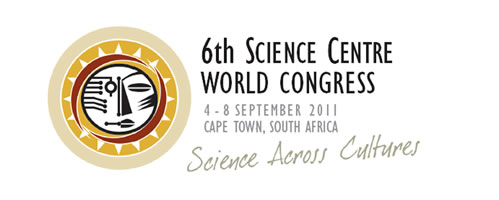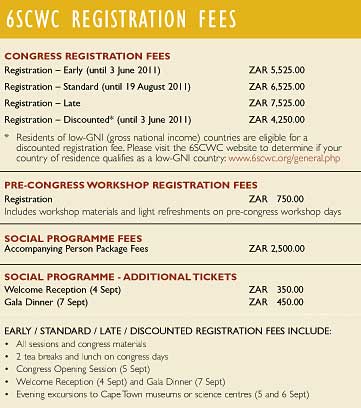Congress Theme: Science Across Cultures
The theme Science Across Cultures addresses the role that science centres
should play in recognising that science is an integral component of our
universal human culture and that science is derived and applied differently
in different cultural contexts. It is not an endeavour that arose out of
one culture, nor do its impacts affect only one culture. The benefits and
costs of science, and of the application and misapplication of scientific
knowledge, affect us all. Furthermore, science centres need to emphasise
the message that a winning nation is a nation that develops an information-based
economy driven by innovation, and which invests strongly in its people.
More at: http://www.6scwc.org/pdf/6SCWC%20Call%20for%20Sessions.pdf
Subthemes
1. Science as part of culture
The development of scientific literacy, i.e. the ability of the general
population to understand the basic concepts of science, is a key success
factor in the modern world and one to which science centres make an important
contribution. Understanding 'how things work', and sharing that knowledge
with others, is a way of honouring one of the nobler impulses of humankind.
The awe and wonder that our early ancestors felt, and which we still feel
today, when confronted with Nature?s grand design, is one of our
most fundamental human emotions. Our role as science centres is to
constantly rekindle this basic emotion, and, at the same time, promote
science as a fair and equitable human endeavour that benefits all cultures
equally. We also need to discuss with our visitors the direction that science
is taking us, and the ethical and psychological consequences of an increasingly
technological world.
2. Building communities through science: the role of
science centres
The social contract between science, and by extension science centres,
and society implies that we should use science for the benefit of all humankind,
as well as for the benefit of the nonhuman inhabitants of our planet. The
international science centre community has the capacity to mount a global
campaign that inspires people of all cultures to recognise that the effective
use of the products and services of science and technology can be used
to empower people and help them to build stable, sustainable and productive
communities.
3. Recognising the multi-cultural roots of science
and technology
Science and technology are not just a Western endeavour ? their roots
can be traced to China, India, Mesopotamia, Egypt, the Islamic world and
Latin America; and to the indigenous peoples of North America, the Arctic,
Latin America, Africa, Asia, Australasia and the Pacific islands. Science
is the product of the collective human yearning for understanding; technology
turns that science into useful products and services; science centres unravel
this complex web and help prepare people for a rapidly changing technological
world. Recognising the multi-cultural roots of science adds colour, context
and a new vibe of excitement to the teaching of science in our institutions.
All science centres should be able to find inspiring examples of the multi-cultural
roots of science at the local, regional or global level.
4. The value of Indigenous Knowledge Systems
The true value of Indigenous Knowledge Systems (IKS) has begun to be
appreciated in Western cultures but a great deal of misunderstanding still
exists. IKS is science developed over millennia through observation and
practical experiment, but it is not 'pseudo-science'. Today, there is a
strong dialogue between modern science and IKS. Traditional science is
under scrutiny but modern science is also enhancing its credibility by
revealing the remarkable theoretical underpinnings of its traditional practices.
Science centres have a vital role to play in highlighting the substantial
role that IKS have played in laying the foundation for modern science,
as well as for a future, more sustainable wave of technologies. Science
centres should also promote the products of IKS in order to bring benefits
to the indigenous people on whose intellectual property they were originally
based. In South Africa, traditional Khoisan hunters who first discovered
the appetite-suppressant properties of the succulent Hoodia gordoni now
receive royalties from the sale of Hoodia products worldwide.
Más información del Congreso, un poquito
de historia y más.
http://www.cientec.or.cr/mhonarc/redpop/doc/msg00434.shtml

